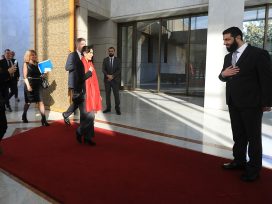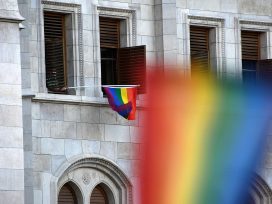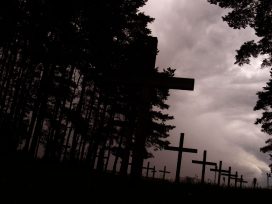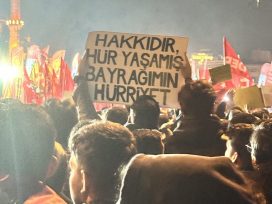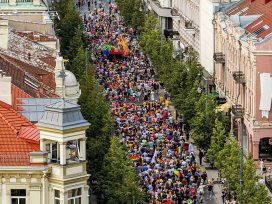It is late November. The day is grey and chilly but people on Zagreb’s main square are patiently queuing up in front of a stand where a few men are collecting signatures. Another appeal to the government to save shipyards or factories? A union calling for another strike? Another plea to the state by impoverished pensioners? No, these people are waiting to sign a petition – the latest fashion in Croatia. This particular one is demanding a referendum to forbid the use of a minority alphabet and language, unless that minority makes up 50 per cent (!) of the population. It is aimed at Serbs and the use of the Cyrillic alphabet in Vukovar, the town on the border with Serbia. Over 30 per cent of Vukovar’s population are Serbs and it is their constitutional right to use the Serbian language. But the town suffered more than any other at the hands of the Serbian military and paramilitary during the war over twenty years ago, and today it is still divided – plaques and signs in Cyrillic are destroyed and the divide manipulated for political purposes.

Outside of the successful tourist industry, the situation is rather difficult: a tree shaped by the wind on one of the Kornati islands in the Adriatic sea off the Croatian coastline. Photo: InavanHateren. Source:Shutterstock
As of last week, these petitioners – war veterans calling themselves the “Council for Defence of Croatian Vukovar” – have gained in strength and confidence. On Monday, 18 November, their members, some of them dressed in some kind of paramilitary uniform, prevented the entire Croatian government, along with the diplomatic corps, from joining tens of thousand of people honouring the dead in Vukovar. The solemn occasion was taken hostage and the government was forced to hold the ceremony at the mass grave at Ovcara instead of at the memorial graveyard.
The day after Vukovar incident, another ugly display took place at Zagreb’s football stadium. After Croatia’s victory over Iceland, one of the players, Josip Simunovic, overtaken by euphoria, led a fascist Ustase salute, the Croatian version of Sieg Heil. This could be seen as the behaviour of an isolated individual, were it not for the reaction of the crowd: some 30,000 people responded by chanting back. The police made no move because, they said, they could see no offence in the behaviour either of the player or the public. This, despite the fact that the Croatian constitution clearly forbids the spreading of hatred based on race, nationality, gender or minority. Interestingly, the minister of interior did not offer his resignation. In the meantime, Simunovic has been fined by Croatian prosecutors for “spreading racial hatred”, but the fact remains: more than 40,000 viewers have “liked” the video of his escapade posted on the Internet.
The EU’s newest member Croatia is a small country “for big holidays” – as the tourist slogan goes, pretty accurately describing its only successful industry. Otherwise, the situation is rather difficult: the unemployment figure is running at 351,000 (19.1 per cent), of which more than 50 per cent is youth unemployment (the third highest rate in the EU); the budget deficit is at 60 per cent of GDP and over 40 per cent of citizens are on the verge of poverty. Despite hopes and expectations, the situation is not getting any better just because of EU membership.
One might think that 4.2 million citizens would be losing sleep over these unpleasant statistics. But it seems that their main worry lies not in the domain of bread, but in sexual morals and national ideology. Just recently, another petition for a referendum succeeded brilliantly. The organization “In the Name of the Family” collected more than 730,000 signatures, reaching well over the 10 per cent required. It proposes inserting an article into the constitution that would ensure that marriage is defined solely as the union between a man and a woman. After some deliberation, the parliament passed the decision to the constitutional court, which decided that the referendum would be held on 1 December, regardless of objections by human and minority rights organizations, who claim it is discriminatory. The result of the referendum is binding. The conservative HDZ opposition has already issued an order to its members to vote in favour, as did the cardinal himself, who instructed priests to “pray for the family” during their services.
An even longer conflict exists between the government, on the one hand, and the Catholic Church and the rightwing parties on the other over sexual education. In language politics, too, there are strong illiberal tendencies. The oldest cultural institution “Matica hrvatska” (Matrix Croatica), is drafting a law on the public use of the Croatian language, suggests policing it in the way that didn’t exist even under Tudjman. Both initiatives should be seen in the context of a step back from progressive European legislation and values.
Are these events coincidences, despite happening at approximately the same time and being organized, covertly or openly, by the same forces? Is it possible that Croatian society, while experiencing EU membership as a “homecoming” and as the taking of a place among equals, is prepared to sink below what are widely considered the achievements of civilized society?
What makes these steps even more interesting and worth looking at more closely is that civil society groups are initiating these changes. It is true that the emergence of a genuine civic space in the former communist countries was seriously hampered by the absence of a democratic legacy. In the region of the former Yugoslavia, and in other countries to different degrees, several factors have contributed to that.
After the political changes in 1989, democracy began – and even remains – pretty much an “empty form”. Institutions were present, but the modus operandi continued to be traditional, in many cases tribal. The most important social networks were and still are the family and party affiliation. Of course, the degree differs from country to country; nevertheless, the principle is the same. Another heritage from communist times is that old structures of control, such as the secret police, were never really abolished: there was no lustration, no trials. Most of the documents were stolen from various state archives and institutions. Former communist countries, especially those with a fascist past like Slovakia and Croatia, inherited a gap – one further aggravated by the wars – between “official history” and private memory. There have been insufficient efforts to bridge this: instead of a common history and historical facts, there is ideological interpretation. Not least, what little civil society activity there used to be in the youth press and music in Croatia and Yugoslavia was destroyed by the recent wars. Nationalism requires homogenization and leaves no space for individual freedom. No wonder it was hard to build a public space under such conditions.
Having said this, in the last twenty years a great many civic organizations of all kinds have sprung up, from groups campaigning to save the city from architectural devastation, to ecologists, to organizations of redundant workers, to human rights and gay and lesbian associations. Like in many other former communist countries, the gay pride parade has become a sign not only of the state of minority rights in Croatia, but of the level of tolerance achieved in society. Needless to say, these organizations are small and considered to have little influence, since their initiatives usually attract a small number of citizens.
But the success of the “In the Name of Family” campaign tells us what could happen when a genuine public space is activated on a mass scale. Until now, any civil society engagement has almost automatically been valued as positive. Yet this is an example of a dominating prejudice becoming evident. Yes, the act of collecting signatures for the referendum was a civic initiative – but considering that human and minority rights are not normally subject to constitutional alteration, is this referendum really in the public interest?
It is not difficult to conclude that something very worrying is happening in Croatia, and that the events I have mentioned are far from coincidental. In a country plagued by economic crisis, unemployment and growing poverty, anxiety and fear of the future are no surprise. Neither is it a surprise that, in times like this, people revert to old and familiar values and patterns of behaviour, above all the nation, tradition and religion. The growing influence of rightwing populism throughout Europe is proof that big parties are incapable of dealing with this anxiety, which takes the form of hatred towards homosexuals, immigrants, Serbs, or whatever scapegoat that pops up tomorrow.
It is a surprise, though, that in a country with no democratic tradition, the “forces of exclusion” contained in civic organizations have quickly learned to use the democratic institution of the referendum in order not only to define the “public interest”, but also to impose their own values. Small countries like Croatia are a curse and a blessing – a curse because they are too small to mean anything in the bigger context of the EU, and a blessing precisely because they have no power. Although others will decide Croatia’s future, worrying signs are appearing, not only in that small and backwards new EU member-state, but in much bigger ones such as Hungary and France. Croatia should therefore be taken as a laboratory for observing a more general trend and serve as a cautionary tale about the rise of frustrations and the aggressive rightwing response by civil society.
Updated on 5 December 2013: In the referendum held on Sunday 1 December, Croats voted overwhelmingly in favour of defining marriage in the constitution as a “union of man and woman”: 65.77 per cent voted for the introduction of a gender-specific formulation while 33.63 per cent voted against. The turnout was 37.89 per cent.
